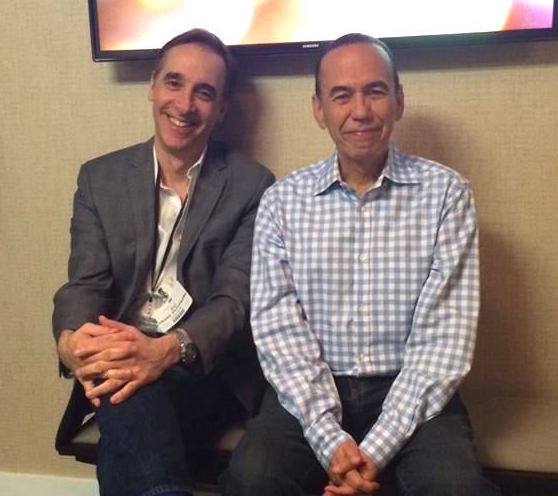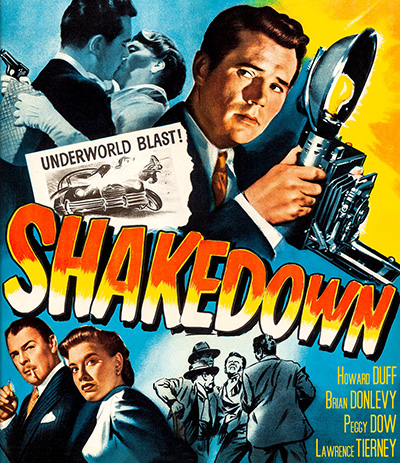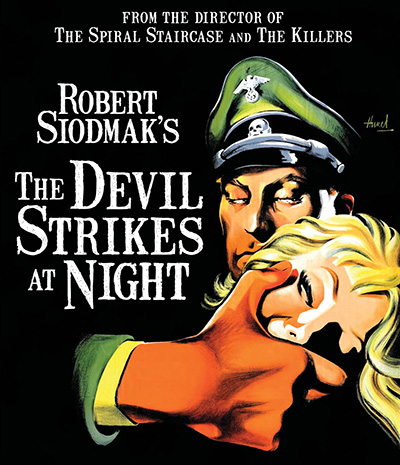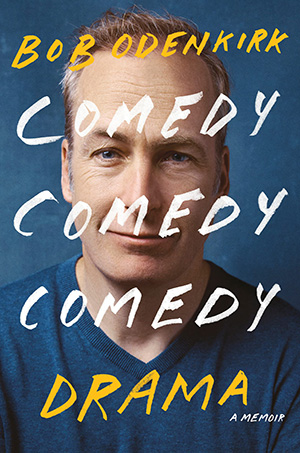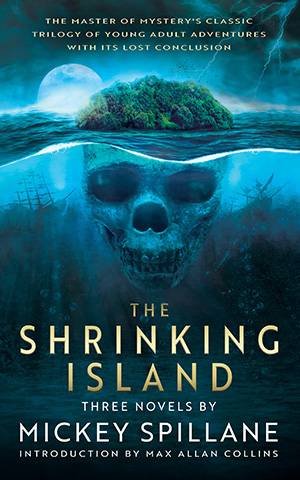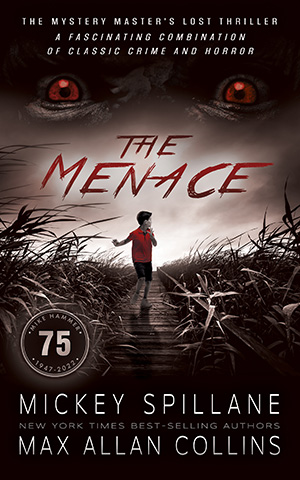The publication date of The Menace by Mickey Spillane and myself (from Wolfpack’s Rough Edges Press) is August 27 (Wednesday of this week, as I write). To jump-start some reviews of this and of The Shrinking Island (the collection of Mickey three YA adventure novels), I am announcing right now a book giveaway. Winners agree to write an Amazon review; other reviews are also encouraged.
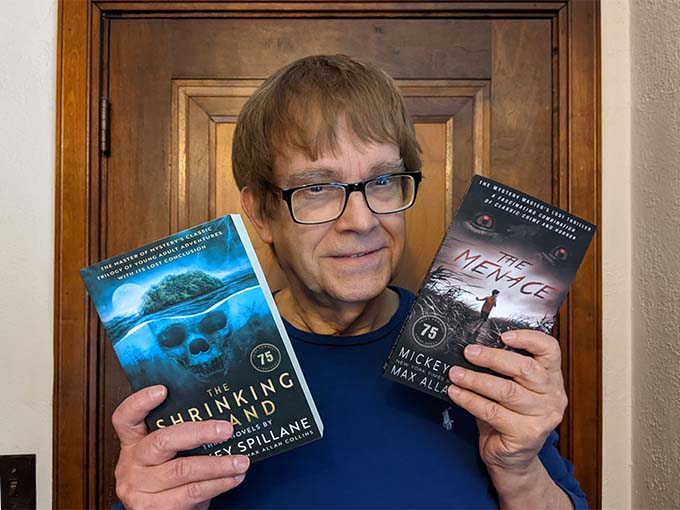
I have five copies of The Menace and five copies of The Shrinking Island for the first ten who request a book by writing me at macphilms@hotmail.com. Tell me which book you prefer, but if your choice is gone, the other will be sent. You must include your snail mail address, even if you’re entered before. These will go fast.
As usual, USA only.
The Menace is a special book. It is unusual in several respects. The Mike Hammer novels under the Spillane/Collins byline reflect me finishing books of Mickey’s in progress or put aside at the time of his death in 2006, or novels developed from synopses he left behind. I’ve also done from partial Spillane manuscripts two non-Hammer novels – The Consummata (with Morgan the Raider from The Delta Factor) and a standalone (Dead Street), with a very Hammer-like protagonist.
The Menace was developed from an unproduced screenplay in the Spillane files. It was apparently written shortly before or around the time he and I became friends in 1981, and he spoke to me of it frequently. He seemed to have an independent production in mind; he was friendly with South Carolina indie producer, Earl Owensby, who had his own studio, and the two had explored doing projects together. Nothing came of it, but The Menace indicates something might have.
But the screenplay was short – around 40 pages – and seems either to be a condensed version designed to attract investors or a version that could have been a pilot for a one-hour anthology series, probably with Mickey hosting. (In the forthcoming Mysterious Press biography by Jim Traylor and me, Spillane: King of Pulp Fiction, we explore Mickey’s efforts to put a mystery/crime anthology on the air with himself as the on-camera Rod Serling or Alfred Hitchcock).
What is particularly interesting about The Menace is the genre – while one foot is in a crime/mystery story, the other is in horror. Elements of horror were a part of Spillane’s novels from the beginning – he brought the horrors of graphic violence to his post-war crime fiction – the endings of Kiss Me, Deadly and My Gun Is Quick come to mind – and flirted with horror themes in The Twisted Thing and his last Hammer-in-progress, The Goliath Bone.
But The Menace is specifically Mickey reacting to the success of Stephen King. I go into this in my intro to The Menace, and will only say here that it was a Spillane reaction to King’s enormous success as a writer who became a media star and who carved out his own new niche in popular fiction. It’s fair to say that King has been imitated in much the same way Mickey was in his heyday.
Spillane did not, however, like the supernatural aspect of King and that other huge success, The Exorcist (book and film). As a Jehovah’s Witness, he took demons and the devil very seriously and did not consider them appropriate subject matter for fiction. He didn’t cry out for censorship, and in fact called King “a great writer”; but that type of horror was not for him.
The novel I’ve fashioned from his compact screenplay is unusual in its crime/mystery aspect having no Mike Hammer substitute at its center, though a tough small-town police chief is one of the two protagonists. The story is about a family where the husband (a self-made-man doctor) and wife (an artist from a wealthy family) have been driven apart by their disagreement over how to raise their ten-year-old “special needs” son. During much of the action, the estranged couple and their boy are in a big old spooky house, the grounds behind walls, which becomes the setting for a siege of sorts involving an Aztec mummy who may or may not still be breathing and a creature who may or may not be human. And at its heart is the story of a family coming back together in adversity.
Not typical Spillane elements, but typically compelling Spillane storytelling. Like the adventure stories he wrote in his last decade – The Shrinking Island, Something’s Down There and The Last Stand – The Menace indicates an author trying to break away from Mike Hammer and flex other storytelling muscles.
I am very proud of the book and think it shows a whole other side to Mickey Spillane. It’s a relatively short novel – 40,000-words – but we have included as a bonus the original, previously unpublished version of the short story “The Duke Alexander” and a rare non-fiction crime story by Mickey, “The Too-Careful Killer,” unseen since 1952.
Yet another of my heroes has left the planet. As if losing Norm Macdonald and Gilbert Gottfried weren’t enough, a selfish God has taken Robert Morse away. Granted, Bobby Morse had a 90 year-run, and I admit when Barb and I screened How to Succeed in Business Without Really Trying in his honor over the weekend, we could not mourn. We could only get caught up again in the joy of experiencing the magical, shamelessly mugging musical comedy performance that is Robert Morse playing J. Pierpont Finch.
I started thinking about what I was going to say about How to Succeed and Morse, but thought I should check on what I’d said on the subject in this space before. And I discovered that in a post in 2017, I had already said the things that my mind was putting together for me to share now. So I’m going to do something I don’t believe I ever have here – I am going to rerun my response to seeing the Twilight Time Blu-ray edition of How to Success in Business Without Really Trying.
One of my favorites, poorly represented with a terrible transfer on DVD, has finally made it to Blu-ray, in a limited edition of 3000, from Twilight Time, the boutique label that has brought us any number of terrific films, from The Big Heat to the Hammer Hound of the Baskervilles, from a Sinatra Tony Rome double feature to Pretty Poison.
But this time – and my birthday month yet – they have given me (and Barb and for that matter son Nate, who also loves it) a film I could watch once a week – How to Succeed in Business Without Really Trying.
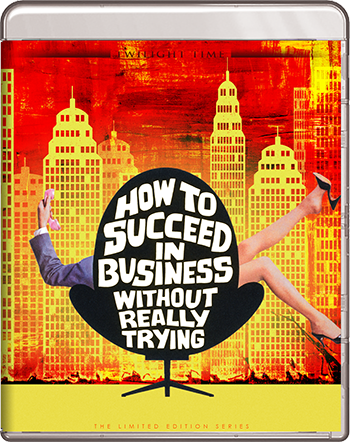
There are those who can find reasons not to like this movie, just as there are people who can find a reason not to like ice cream. They are to be pitied. How to Succeed features a brilliant, witty, acid but not hateful score by the brilliant Frank Loesser. A Pulitzer Prize-winning musical (yes, Pulizter Prize-winning musical) in 1961, the Broadway version skewered the shallowness of big business in an up-to-the-moment manner. Unfortunately, the timing of the film’s release – 1967 – made How to Succeed’s cutting-edge satire seem dated, a lot having happened since ‘61.
Fortunately, time has been kind to this early ‘60s musical, with its bright Batman TV colors and cartoon images come to life (cartoonist Virgil Partch – VIP – was a consultant) and Bob Fosse choreography that is as witty and biting as the original play itself. (Fosse is not the actual choreographer of the film, but he’s credited as the source.)
A number of players from the Broadway show are retained, including Michelle Lee (who was the second Rosemary Pilkington in the original cast), the very funny Rudy Vallee, Ruth Kobart, and Sammy Smith, with Charles Nelson Reilly’s Bud Frump M.I.A., though decently replaced by Anthony Teague. Maureen Arthur – a live-action Little Annie Fannie – was in the national company of the musical and joined the Broadway run later.
I saw the national company in Chicago when I was in high school and fell in love with the musical then. The cast included Dick Kallman as Finch (later star of Hank on TV), who was excellent, with the second Great Gildersleeve, Willard Watterman, in the Rudy Vallee role. And of course the eye-popping Maureen Arthur was Hedy LaRue (“O.K. Charlie!”).
Two things make this film one of the best transitions of a Broadway hit to the big screen. First, director/writer David Swift – with credits like Pollyanna and Under the Yum Yum Tree enough to make one doubtful – had the surprising sense to film faithfully a show that had won seven Tony Awards, the New York Drama Critics Circle award, and the 1962 Pulitzer Prize for Drama.
The other thing is Robert Morse.
His J. Pierrepont Finch is my favorite performance in any musical film. He shamelessly recreates the Broadway role with only the slightest concession to movie technique. He understands, as does the rest of the cast (though not on this level), that he’s appearing in a cartoon. His character, who climbs from window washer to the chairman of the board in a few days, following a self-help book that provides the film’s narration – should be unsympathetic. He’s manipulative and dissembling and is never seen really working (not really trying, remember?); but the boyishness of Morse himself smooths the edge off.
Morse brings a remarkable energy to his songs and his loose-limbed dancing brings James Cagney to mind. In the ensemble, “Brotherhood of Man,” in the midst of a sea of Bob Fosse choreography, brilliant scene-stealer Morse knows just how to draw the viewer’s eye, chiefly by lagging like a jazz player behind the melody just enough to seem improvisional among all the precise dancers. He alone seems spontaneous.
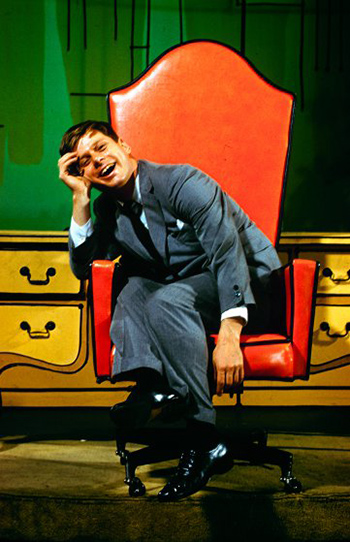
Does he mug? Almost constantly. His performance is basically Jerry Lewis Goes to Graduate School. Somehow, playing a ladder-climbing nogoodnik, he seems joyful – the perfect conveyer of Loesser’s lyrics, with their hidden dark side.
Famously, the big hit love song from How to Succeed is sung by Morse’s Finch…to himself in a mirror. Few scores rival this one, though like Sondheim, Loesser writes to the story. The songs that were left out (“Paris Original,” “Happy to Keep His Dinner Warm”) are the weakest in the show. The only loss, besides Charles Nelson Reilly, is the great “Coffee Break,” which was filmed but cut for time. Too bad it doesn’t seem to have survived to be a special feature.
Morse and Reilly, by the way, were so successful on Broadway that they made an album together, “A Jolly Theatrical Season,” in 1963.
If the name Robert Morse seems vaguely familiar to smart younger people, he played Bertram Cooper on Mad Men, a role he was cast in, in tribute to his star turn in How to Succeed. Toward the end of Mad Men’s run, Morse was given a lovely song-and-dance farewell.
Morse’s career on Broadway was a stellar one, particularly his roles in Sugar and his one-man play, Tru, in which he played Truman Capote, winning his second Tony. But his film legacy is, largely, How to Succeed. No other film caught his magic, and a few really did him no favors – Honeymoon Hotel; Quick, Before It Melts – though The Loved One and Guide for the Married Man are worthy credits. I used to feel sad that this great talent had only one film to do him justice.
But with How to Succeed finally on Blu-ray, and with Mad Men as a wonderful, Emmy-nominated coda, I can only smile.
Nice modern-day (separate) interviews with Morse and Michelle Lee are special features. No “Coffee Break,” alas.
Buy it here.
UPDATE: The Twilight Time Blu-ray is still available but is pricey from some sources, although Screen Archives still has it at $20.
Let me add a few thoughts. Morse, who I describe above as “Jerry Lewis Goes to Graduate School,” shared with Lewis an inability to move from boyishness into anything else. It took the heavy make-up of his Truman Capone one-man show to briefly change that – he won a second Tony for it, after all – but he remained a boyish persona.
His rise to success (and Succeed) came from a string of stand-out youthful Broadway roles that culminated in J. Pierpont Finch being designed as a star vehicle for him. Two Broadway revivals have not shown their popular stars able to make their performances anything but reminders of how good Morse was.
He worked. He had a career. For a while he remained hot on Broadway, with Sugar (the musical version of Some Like It Hot) in 1972 a particular highlight. But mostly it was episodic TV and TV movies (he played Grandpa Munster in one), Pringle commercials and lots of cartoon voiceovers (Teen Titans, toward the end) – not what his dazzling How to performance promised.
That he had Mad Men as a last act is wonderful. But he deserved more. And we deserved more Morse.
Richard Piers Rayner’s phenomenal work on Road to Perdition gets some nice notice here in a piece on movies that recreated panels from the comic books they were based on.
M.A.C.
